#Leadership Lessons from Failure
Explore tagged Tumblr posts
Text
Leaderships Seven Deadly Sins
Photo by Samia Liamani We have all heard of the seven deadly sins. If you are a regular churchgoer, you probably heard and recited them more than others. You will probably also understand them more than most. While watching a few YouTube videos, I stumbled across a video on the seven deadly sins. Although I am in no way highly religious, I did start to see a correlation between the sins and the…

View On WordPress
#Avoidable Leadership Mistakes#Critical Leadership Errors#darren walley#darren walley consultancy#darrenwalley#Deadly Leadership Traits#Executive Errors#Executive Misjudgments#Fatal Flaws in Leadership#Fatal Leadership Flaws#Flawed Leadership Practices#Leadership Blunders#Leadership Blunders to Beware#Leadership Catastrophes#Leadership Fiascos to Learn From#Leadership Gaffes#Leadership Lessons from Failure#Leadership Pitfalls to Avoid&039;Common Leadership Failures#Leadership Slip-Ups to Watch Out For#Managerial Missteps#Managerial Mistakes#Seven Deadly Leadership Sins
0 notes
Text
TAI Motivational Moments Blog: Colonel Sanders faced decades of failure before launching KFC at 65. Discover how persistence and resilience helped him build a fast-food empire. Learn leadership lessons from his journey. The fourth blog in the From Epic Fails to Legendary Wins series.
#Colonel Sanders Success Story#KFC Founding Story#Colonel Sanders Biography#Leadership Lessons from KFC Founder#Entrepreneurs Who Found Success Late#Overcoming Business Failure#Never Give Up on Your Dreams#Late Life Success Stories#Entrepreneurial Persistence#Overcoming Business Rejection
0 notes
Text
Saturn through the degrees 🪐🪐
🪐Saturn represents discipline, structure, responsibility, karma, and life lessons. The degree it occupies in your natal chart refines how you experience challenges, maturity, and long-term success.
0° Saturn – The Pure Authority
• Born with a strong sense of duty and leadership.
• Challenges arise early, but rewards come with patience.
1° Saturn – The Determined Initiator
• Takes responsibility seriously but may struggle with self-doubt.
• Must develop confidence in their abilities.
2° Saturn – The Stable Builder
• Creates long-lasting success through steady effort.
• Struggles with perfectionism but thrives in practical work.
3° Saturn – The Communicative Mentor
• Learns and teaches through spoken or written word.
• Must overcome fear of expressing authority.
4° Saturn – The Structured Traditionalist
• Highly disciplined and prefers tradition over change.
• Finds success in law, government, or stability-focused careers.
5° Saturn – The Confident Creator
• Can become a powerful leader, but needs self-trust.
• Struggles with balancing authority and flexibility.
6° Saturn – The Relationship Balancer
• Life lessons come through commitment, partnerships, and fairness.
• Can be overly cautious in love and business.
7° Saturn – The Mystic Realist
• Struggles between spirituality and realism.
• Finds discipline through philosophy, esoteric studies, or science.
8° Saturn – The Strategic Powerhouse
• Gains success through strategy, patience, and resilience.
• Must avoid controlling tendencies.
9° Saturn – The Expansive Teacher
• Learns through life experiences and global perspectives.
• Can feel restricted but eventually gains wisdom through travel or philosophy.
10° Saturn – The Manifestation Master
• Has a natural ability to turn visions into reality.
• Success comes from long-term planning and perseverance.
11° Saturn – The Revolutionary Authority
• Struggles with rules but eventually creates new systems.
• Can bring innovation into traditional structures.
12° Saturn – The Dreamy Worker
• A mix of practicality and creativity, needs discipline to ground dreams.
• May struggle with self-doubt or escapism.
13° Saturn – The Fearless Decision-Maker
• Gains strength through resolute choices.
• Must learn to trust instincts and avoid hesitation.
14° Saturn – The Balance Seeker
• Challenges arise in finding equilibrium between work and personal life.
• Can become an excellent mediator or peacemaker.
15° Saturn – The Legacy Builder
• Naturally drawn to leaving a mark on the world.
• Must embrace responsibility and avoid fear of failure.
16° Saturn – The Wise Guide
• Life lessons push them toward mentorship, coaching, or teaching.
• May experience early hardships that shape wisdom.
17° Saturn – The Fearless Worker
• Has strong work ethic but struggles with overworking or burnout.
• Must learn to delegate and balance effort with rest.
18° Saturn – The Deep Thinker
• Drawn to psychology, philosophy, or investigative fields.
• May struggle with rigid thinking or emotional suppression.
19° Saturn – The Bold Risk-Taker
• Learns through trial and error, often facing big life lessons.
• Gains strength through calculated risk-taking.
20° Saturn – The Patient Master
• Success is delayed but deeply rewarding.
• Must embrace delayed gratification and persistence.
21° Saturn – The Public Figure
• Challenges come through fame, public recognition, or societal roles.
• Must learn to balance personal integrity with external expectations.
22° Saturn – The Master Builder (Karmic Degree)
• Highly karmic placement, linked to great achievements or downfall.
• Requires extreme discipline, focus, and integrity.
23° Saturn – The Strategic Risk-Taker
• Learns when to push forward and when to retreat.
• Can be very calculated in business, finances, or leadership.
24° Saturn – The Romantic Realist
• Life lessons often involve love, creativity, or beauty.
• Must balance idealism with practicality.
25° Saturn – The Spiritual Worker
• Gains wisdom through spiritual studies, healing, or devotion.
• Needs structure to ground spiritual growth.
26° Saturn – The Reserved Strategist
• Prefers to work behind the scenes rather than be in the spotlight.
• Success comes through long-term planning and steady execution.
27° Saturn – The Karmic Healer
• Deeply tied to ancestral karma and healing generational wounds.
• Can become a great mentor, therapist, or spiritual guide.
28° Saturn – The Bold Traditionalist
• Faces power struggles with authority but ultimately becomes a leader.
• Can challenge old systems or reinforce them in a more evolved way.
29° Saturn – The Fated Leader (Anaretic Degree)
• Intensely karmic, often signaling a life of heavy responsibility.
• May feel like they are “tested” more than others.
• Must embrace maturity, responsibility, and resilience to succeed.
#astro notes#astrology#birth chart#astro observations#astro community#zodiac signs#astrology observations#astrology degrees
1K notes
·
View notes
Text
The funniest thing to me about Kel, and maybe one of the most interesting because of how understated it is, is that Kel becomes a good commander in the end, not by emulating Wyldon who was cold and implacable and insensitive, or by emulating Raoul who mostly only disobeys orders out of principle or because he has an issue with what the order says about his personal relationship with Jon, but by emulating JON.
Kel doesn't even LIKE Jon, she BARELY respects him as a person. He's a good enough ruler that she's willing to fight for him and swear loyalty to him and to at least mostly believe that he wouldn't work with Blayce to make his own killing monsters, but that's as far as it goes for Kel. If he's kind to her, she finds it uncomfortable and almost untrustworthy because she assumes he doesn't care about her and so his kindness and respect towards her must be fake.
But from the outside, as readers, we know just how much Jon fought for Kel. We know how much he does respect her right to be a knight. Jon is the sole reason that Kel DID get the opportunity to prove herself, if he'd capitulated to Wyldon completely, she just wouldn't have ever been allowed to join. Kel doesn't KNOW THAT, obviously, but we do. We know that Jon did everything he could to find a way to convince Wyldon to let Kel become a page. While Wyldon claims later that the reason he chose to let her stay at the end of the probation year was because his better judgment convinced him she'd earned it, I'd be willing to bet that part of that better judgment also included knowing if he couldn't prove to JON that she needed to go, then he'd be in trouble. Kel was training and working in front of plenty of other trainers and teachers who could easily contradict Wyldon's lies if he'd tried it, many of whom are closer to Jon than they are to Wyldon.
Kel's experiences and feelings about that experience are entirely valid, and she doesn't have the knowledge we do about how hard Jon fought for her, so it's not shocking that she's upset with him for a good portion of her series. She never even discovers this truth by the end of her series, even though she does get a lesson from Jon and Thayet (and Raoul to some degree) about how politics and compromises work in order to make changes happen. So her opinion of him by the end is boiled down to the quote from Squire: "good kings weren't always good men." It makes sense for her to think this, but because Kel's knowledge base is so limited (and her worldview so black and white for much of her series), it makes her an EXTREMELY unreliable narrator about this particular issue.
Kel believes that while Jon generally does his duty and keeps the peace, he doesn't actually care all that much about his people as individuals. But in their only meaningful conversation in Squire, Jon is able to point out that he (and Thayet, who is actually equal to Jon in power, something Kel either doesn't know which would be a failure in her education or just tends to ignore so she can focus her ire on Jon) has to make a LOT of compromises in order to get ANYTHING useful done at all. Sometimes, often, it means making deals with people he doesn't like or people he just fundamentally disagrees with, because it's the first step in a multi-step plan to help more people in the long run. He also points out that just throwing his weight and authority around in order to be able to change everything he wants to change immediately regardless of what anyone else thinks about it is a great way to get himself and his family killed. Because even if he had good intentions, that would be tyranny. It does make Kel think a little, but she doesn't tend to like him much still afterwards, her resentment from her page years will always color her opinion of him a little.
However, then she gets to Haven and she's suddenly tossed into a position of leadership over a lot of other people, many of whom disagree with each other or disagree with her or both. And all of the sudden, Kel has to make compromises. She doesn't LIKE the way the sergeants often treat their men, especially the sergeants whose men are convicts, but there's very very little she can do about it without really pissing off those same sergeants and that's not something she can afford to do. There's a moment when Neal starts getting frustrated about the treatment of the convicts and she takes him out to vent to her so he doesn't vent to the sergeants, something that the sergeants would then take out on their men. Kel's reasoning as she does this is that she "preferred to avoid battles with them now so she would have authority with them later if she needed to use it." Later, Kel is talking to Daine and she says "That's all this job is... Trying to please everyone and pleasing no one. And it will only get worse, not better."
Both of these moments showcase Kel choosing to make compromises. She may not like the way the sergeants treat the convicts, but she needs to stay on the sergeants' good sides because she doesn't have enough resources to butt heads with them nor enough authority to just force the issue, and even if she DID, it could cause the sergeants to become troublesome or take out their frustration with her on the men in ways she can't see as well. But staying on the sergeants' good sides might mean letting some of their maltreatment slide if it's not physically harming the convicts. And even setting that aside, she's dealing with nearly 500 refugees eventually, all of which are from different towns in the area and have different needs, not all of which she can accommodate. This requires compromise. Sometimes she can please some of them and not others, but mostly she probably just ends up not pleasing anybody because that's often how compromises WORK.
She never makes the active connection to Jon and his lesson on leadership from Squire while she's in Haven, but that quote up there about how this job (aka being a commander) is all about trying to please everyone and pleasing no one? It sounds a HECK of a lot like "good kings weren't always good men." You can try your best to help others, but often doing the right thing can involve making everyone unhappy. You can't be everybody's friend if you're going to get anything done.
Some of this she might've learned from Raoul's style of command, but Raoul commands a fairly small amount of people (at least in comparison to a King), and so we see him able to be pretty friendly to the people he commands in a way that Jon is perhaps unable to do. And she might believe that she learned some of this from Wyldon, but Wyldon had a tendency to be very unfair and biased due to his raging bigotry and conservative values, as well as the fact that he doesn't actually even LIKE being a training master and that likely impacted the way he treated the pages (he's almost never that kind to the pages, whereas we see him capable of being quite kind with the refugees later, which is where Kel comes to the conclusion that he hadn't enjoyed being a training master).
But Jon makes an entire speech about how he (and Thayet) have been working THEIR ENTIRE REIGN to change laws that help people. He explains how they have to consider the needs of merchants, nobles, farmers, street people, priests/priestesses, and mages. They have to consider not only what these people might need or want, but also what they could do when they feel sufficiently offended and how that could impact not just the royal family or the nobility but the realm as a whole. Jon points out that they HAVE made changes, for the better, and that just because they don't always succeed at everything or because they have to compromise sometimes, doesn't mean they aren't working at making changes or that they don't care about helping people. Not everyone you have power over is going to be your friend, they might not even be someone you like. But if you're going to take on the job of leadership, that's something you have to be willing to accept and work with, which often means making compromises with people whose needs and values are contradictory to your own.
Jon probably knows when he makes the compromise with Wyldon that it will likely impact a lot of people's good opinion of him. Alanna is right there and clearly angry, and we know Thayet doesn't like the decision, either. And it's entirely possible that Jon knows in the moment that Kel herself will put the blame on him because he's the King. But he also knows that if he insists on Kel being allowed to be a page without trying to compromise with Wyldon, Wyldon will quit over it and he'll end up with ten DIFFERENT problems that could cause a lot bigger issues to far more people than just one girl. So he makes the compromise. He sacrifices Alanna and Thayet and even Kel's good opinion of him in order to ensure that Kel gets the opportunity to become a Knight without turning all of his nobles against him which could ultimately lead to a civil war. Is it fair? No, and he knows it. But it's the best option he has in order to get the outcome they all actually want which is just for Kel to have the chance to prove herself.
Kel has to make similar choices once she's finally in a position of leadership of her own. And whether she realizes it or not, without ever even spending more than a few minutes with Jon, she ends up emulating his leadership style more than anybody else's because it WORKS and it works WELL. She'll probably never admit it, she might never even realize it herself, but she's so much more like Jon than any of the other men she sees as role models. And I love that. I love the dramatic irony of that, that the one person Kel only barely respects because of a compromise he made on her behalf that she'll never even know about, is the person Kel ends up most resembling. Jon is the reason she has the opportunity to become the Protector of the Small in the first place, Jon is the person who created that environment that allowed her to nurture those values, and she'll probably never even really be able to acknowledge that, because sometimes that's what being a good leader means.
729 notes
·
View notes
Text
Saturn in Aries
predictions for each Rising
paid readings | Masterlist



ᡣ𐭩 Please support me by reposting, liking, following me. From the 25th of May 2025 to September 1st 2025 (where saturn will station in mercury retrograde) and will become direct once again 27 November 2025, till the 13th of April 2025.
With saturn in aries, saturn will force you to build new foundations, and confronting fears related to independence and bold action. This period will challenge us to be more accountable for our individual drives and to find a mature balance between initiating new ventures and ensuring their long-term viability. Expect to learn valuable lessons about leadership, self-reliance, and the true cost of pioneering new paths.
Aries Rising - Saturn's transit through your first house of self and identity will be a profound period of redefinition. You may feel a significant pressure to solidify who you are, potentially leading to an "identity crisis" as old ways of being are challenged. This is a powerful time for self-mastery and reinvention, as Saturn encourages you to take responsibility for your life and build a more solid foundation for your future self. You'll learn to balance impulsivity with patience and strategic action, leading to a new, mature confidence. If you were born with Saturn in Aries, this is your Saturn Return, a pivotal period of adulting and making firm commitments.
Taurus Rising - will experience Saturn's influence in your twelfth house of the subconscious and hidden matters. This transit encourages deep spiritual growth and healing, calling you to go inward and confront your shadow side. Old patterns of escapism or avoidance may come to the surface, demanding to be addressed. While this can be a solitary period, it offers a chance to release fears and build a strong spiritual practice. By the end of this transit, you can emerge feeling more whole and ready to spread your "new, healed wings."
Gemini Rising - Saturn will be in your eleventh house of friendships, community, and aspirations. Your social circles and group connections may undergo a significant review, with some relationships feeling strained or karmic. You may need to prune your social circle, choosing quality over quantity. This is a time to solidify your long-term goals and choose meaningful alliances. You might be called to leadership within groups, taking on more responsibility. By releasing unhealthy connections, you make room for those who truly support your aspirations.
Cancer Rising - will feel Saturn's weight in your tenth house of career, public image, and destiny. You may feel intense pressure to succeed professionally, and recognition might not come as easily as you hoped, with every misstep feeling public. The road to achieving your goals might be steep and solitary, with delays feeling like failures. However, this is an excellent period for career advancement and building a solid reputation. If you're willing to play the long game, what you build now can define you for decades. You'll learn to take responsibility for your ambitions and step into leadership roles, even if it requires hard work and patience.
Leo Rising - will experience Saturn in your ninth house of higher learning, travel, and belief systems. Your beliefs may be challenged, and previous worldviews might crumble, possibly through disappointing teachers or systems. The way forward might not be obvious, and traditional avenues of expansion may feel restricted. However, your greatest growth will come through broadening your horizons. This is an excellent time to pursue advanced degrees or engage in structured learning. You'll learn what it truly costs to live your truth and build a more resilient and meaningful philosophy of life.
Virgo Rising - Saturn transits your eighth house of shared resources, intimacy, and transformation. This is a period for getting your financial house in order, with issues around taxes, wills, insurance, and inheritances potentially requiring your attention. You'll be encouraged to confront your relationship with vulnerability and power dynamics in intimate connections. This transit offers a chance for deep financial restructuring and psychological healing. By addressing these areas, you can set yourself up for a more secure future and develop a healthier approach to shared resources and intimacy, learning to navigate complex emotional and financial territories with maturity.
Libra Rising - Saturn in your seventh house of partnerships and relationships. Your one-on-one connections will be highlighted, and you'll be asked to consider the health and responsibility within them. You may face challenges in finding true reciprocity and give-and-take, with discussions around commitment and boundaries becoming intense. However, this is a time to build more committed and dependable partnerships. You'll learn to establish clearer boundaries and ensure your relationships are balanced. You'll seek long-term stability and won't be interested in casual connections, leading to deeper, more mature bonds.
Scorpio Rising - Saturn moves into your sixth house of health, daily routines, and service. You may feel pressure to restructure your daily life and become more disciplined with your health and routines, potentially involving addressing long-standing habits. Work responsibilities might increase, or you may face challenges in your work environment. This transit provides an opportunity to build healthier habits and a more organized daily life. You can become more efficient and productive in your work. It's a time to take responsibility for your well-being and establish sustainable routines that support your goals.
Saggiatrius Rising - will experience Saturn in your fifth house of creativity, self-expression, and joy. You might struggle to find time for hobbies, dating, or creative pursuits, and your sexual energy may be lower. There could be delays or challenges related to children, and joy might feel risky, with creative expression feeling blocked or like hard work. However, Saturn in Aries encourages you to develop a more mature relationship with joy and creativity. You're asked to create and love without expecting instant gratification. This is a time to carve out dedicated time for what truly brings you fulfillment and to be disciplined in your creative endeavors, leading to more lasting and meaningful expressions.
Capricorn Rising - Saturn transits your fourth house of home, family, and foundations. You may face increased responsibilities within your family, potentially needing to care for aging family members or deal with structural issues in your home. Some Capricorns might move to a longer-term home, which could come with its own set of challenges. This transit helps you solidify your home base and family foundations. You can create a more stable and secure living environment. It's a time to embrace your responsibilities within your family, leading to a deeper sense of belonging and inner security.
Aquarius Rising - will have Saturn in your third house of communication, learning, and local community. Communication might feel like a battlefield, and you may struggle to express yourself without being too blunt or moving too fast. Relationships with siblings or neighbors could become sources of stress. You're being asked to pause before speaking and to listen more effectively. This is a period to refine your communication skills and take your mental health seriously. You'll become more assured in your educational, writing, and public speaking abilities, and you can form deeper connections within your local community by practicing thoughtful and disciplined communication.
Pisces Rising - For Pisces rising, Saturn moves into your second house of personal finances, values, and self-worth. You may feel a strong urge to get your finances in order, pay off debts, or improve your credit score. You might initially feel a sense of scarcity, even if you are earning well. This transit encourages you to reconsider your outlook on wealth and self-worth. This is a prosperous cycle for establishing financial security, but it requires discipline and a reevaluation of your values. You'll learn to manage your resources more effectively and develop a stronger sense of self-respect and self-worth, leading to long-term financial stability.

DISCLAIMER: This post is a generalisation and may not resonate. I recommend you get a reading from an astrologer (me). If you want a reading from me check out my sales page.
@astrofaeology private services 2025 all rights reserved
#astr#astro observations#astroblr#astro community#astro notes#astrology#saturn in aries#aries#rising signs#rising
329 notes
·
View notes
Text
𝖠𝗋𝖼𝗁𝗂𝗏𝖾𝗌 𝗈𝖿 𝗍𝗁𝖾 𝖲𝗈𝗎𝗅: 𝖯𝖺𝗌𝗍 𝖫𝗂𝖿𝖾 𝖠𝗌𝗍𝗋𝗈𝗅𝗈𝗀𝗒 (𝖯𝖺𝗋𝗍 2)

I apologize for the delay of part two. I've been sick and am still recovering, but I am energized enough to do a post. In part two, we will be talking about Saturn and how it can show your past life karma.
𝖧𝗈𝗐 𝖢𝖺𝗇 𝖲𝖺𝗍𝗎𝗋𝗇 𝖲𝗁𝗈𝗐 𝖸𝗈𝗎𝗋 𝖯𝖺𝗌𝗍 𝖫𝗂𝖿𝖾 𝖪𝖺𝗋𝗆𝖺?
Saturn represents karma, lessons, and discipline. It's placement in your chart can reveal what you could have carried over from previous past lives into this one, good or bad. It can show where you might have experienced struggles or where you failed to meet certain responsibilities.

𝖲𝖺𝗍𝗎𝗋𝗇 𝗂𝗇 𝗍𝗁𝖾 𝖧𝗈𝗎𝗌𝖾𝗌 𝖺𝗇𝖽 𝖲𝗂𝗀𝗇𝗌
𝖲𝖺𝗍𝗎𝗋𝗇 𝗂𝗇 𝖠𝗋𝗂𝖾𝗌 𝗈𝗋 1𝗌𝗍 𝖧𝗈𝗎𝗌𝖾
Your karma lies in learning how to balance boldness with patience. In a past life, you may have pushed forward recklessly, charging into battles of life without understanding the consequences of impulsivity. You now have to try and master the art of responsible leadership, which is facing your fears of failure and learning that true strength lies in knowing when to act and when to pause.
𝖲𝖺𝗍𝗎𝗋𝗇 𝗂𝗇 𝖳𝖺𝗎𝗋𝗎𝗌 𝗈𝗋 2𝗇𝖽 𝖧𝗈𝗎𝗌𝖾
Your karmic lessons revolve around detachment from material possessions and an over-reliance on comfort. Perhaps there was a tendency to cling too tightly to stability, fearing change and loss. This lifetime, you're being asked to trust in the cycles of life, to release your grasp on permanence, and to find value beyond the tangible.
𝖲𝖺𝗍𝗎𝗋𝗇 𝗂𝗇 𝖦𝖾𝗆𝗂𝗇𝗂 𝗈𝗋 3𝗋𝖽 𝖧𝗈𝗎𝗌𝖾
Your karma lies in finding clarity and truth in your thoughts and words. The mind, once scattered and restless, is now called to discipline. Perhaps you spoke without care, spread misinformation, or avoided truths in favor of shallow pursuits. In this lifetime, you're being asked to respect the weight of your words and to approach learning with dedication, not fleeting curiosity.
𝖲𝖺𝗍𝗎𝗋𝗇 𝗂𝗇 𝖢𝖺𝗇𝖼𝖾𝗋 𝗈𝗋 4𝗍𝗁 𝖧𝗈𝗎𝗌𝖾
Your karmic lessons are tied to emotional resilience and boundaries. In a past life, you may have been overly nurturing to the detriment of your own well-being, or avoided emotional vulnerability out of fear. In this lifetime, try to find a balance. Care for others without losing yourself and allow yourself to feel deeply without being consumed.
𝖲𝖺𝗍𝗎𝗋𝗇 𝗂𝗇 𝖫𝖾𝗈 𝗈𝗋 5𝗍𝗁 𝖧𝗈𝗎𝗌𝖾
Your karma revolves around humility and the responsible use of your creative gifts. There may have been a tendency to seek validation through external applause or to prioritize self-interest above collective well being. In this life, you're being asked to shine your light responsibly, to create not for recognition but for purpose, and to understand that true confidence is quiet and self sustaining.
𝖲𝖺𝗍𝗎𝗋𝗇 𝗂𝗇 𝖵𝗂𝗋𝗀𝗈 𝗈𝗋 6𝗍𝗁 𝖧𝗈𝗎𝗌𝖾
Your karmic lessons center around the perfection of self, not through criticism, but through acceptance. Perhaps there was an overemphasis or fixation on your flaws or the flaws of others. In this lifetime, you are being asked to embrace imperfection and approach life with a spirit of service rather than judgment.
𝖲𝖺𝗍𝗎𝗋𝗇 𝗂𝗇 𝖫𝗂𝖻𝗋𝖺 𝗈𝗋 7𝗍𝗁 𝖧𝗈𝗎𝗌𝖾
Your karma is tied to relationships and the balance of give and take. Perhaps there was a tendency to avoid confrontation, sacrificing your needs for harmony, or to manipulate relationships to maintain control. In this lifetime, you are being asked to face the truth in relationships, embrace fairness, and build authentic connections. Justice begins within, and only through self-awareness can true balance be achieved.
𝖲𝖺𝗍𝗎𝗋𝗇 𝗂𝗇 𝖲𝖼𝗈𝗋𝗉𝗂𝗈 𝗈𝗋 8𝗍𝗁 𝖧𝗈𝗎𝗌𝖾
Your karma revolves around power, transformation, and trust. There may have been an obsession with control, secrecy, or a fear of vulnerability in a past life. In this lifetime, your being asked to face the depths of your emotions, to release what no longer serves you, and to rebuild yourself from the ashes. True power comes from transformation, not resisting it.
𝖲𝖺𝗍𝗎𝗋𝗇 𝗂𝗇 𝖲𝖺𝗀𝗂𝗍𝗍𝖺𝗋𝗂𝗎𝗌 𝗈𝗋 9𝗍𝗁 𝖧𝗈𝗎𝗌𝖾
Your karma lies in reconciling freedom with responsibility. Perhaps you chased truth at the expense of others or sought endless expansion without grounding your pursuits. In this lifetime, you're being asked to commit to a higher purpose and ground your ideas into your reality. Wisdom is not found in escape, but in meaningful exploration and philosophy that enriches yourself and others.
𝖲𝖺𝗍𝗎𝗋𝗇 𝗂𝗇 𝖢𝖺𝗉𝗋𝗂𝖼𝗈𝗋𝗇 𝗈𝗋 10𝗍𝗁 𝖧𝗈𝗎𝗌𝖾
Your karma is tied to responsibility and ambition, often feeling like the world rests on your shoulders. In a past life, you may have prioritized success over humanity, or avoided accountability. In this lifetime, you're being asked to lead with integrity, to redefine success as something deeper than status, and to honor your commitments, without losing sight of your heart.
𝖲𝖺𝗍𝗎𝗋𝗇 𝗂𝗇 𝖠𝗊𝗎𝖺𝗋𝗂𝗎𝗌 𝗈𝗋 11𝗍𝗁 𝖧𝗈𝗎𝗌𝖾
Your karma is tied to individuality and collective. Perhaps there was a tendency to rebel without purpose or to isolate yourself from the very communities you sought to help. Saturn in Aquarius asks that you integrate your unique vision with the needs of humanity. Innovation must be paired with responsibility and true progress comes from working within and outside the system.
𝖲𝖺𝗍𝗎𝗋𝗇 𝗂𝗇 𝖯𝗂𝗌𝖼𝖾𝗌 𝗈𝗋 12𝗍𝗁 𝖧𝗈𝗎𝗌𝖾
Your karmic lessons revolve around faith, boundaries, and spiritual discipline. In a past life, you may have avoided reality, escaping into dreams or martyrdom in a past life. This lifetime calls you to ground your spirituality, to practice compassion without self sacrifice, and to face life's hardships with quiet strength. Divine connection is not an escape, but a tool for navigating the material world with grace.

Thank you for reading! If you have any additional questions or questions about specific aspects, comment down below and I will answer.
Credit: @selenepsyche
#astrology#birth chart#spirituality#astro observations#astrology observations#divination#saturn#saturn astrology#past life astrology#past life#aries#scorpio#sagittarius#capricorn#aquarius
205 notes
·
View notes
Text
okay im typing out my current understanding to try to improve it. please send hate mail so i can take the 10% of it that is useful and self-criticize. here goes: all leninists agree that the proletariat did legitimately seize power in the october revolution. beyond that, positions differ.
orthodox MLs, for lack of a better term, argue the proletariat retained state power until the dissolution of the USSR. this leads to a position of primarily defending the USSR and pointing mainly to the attacks of international capitalism and fascism, as well as a lack of previous experience, as the reasons for soviet excesses and failures.
trotskyists argue that under stalin, a bureaucracy took state power from the working class. this leads to a position of arguing for a new proletarian vanguard to overthrow bureaucratic states, and pointing mainly to the lack of successful proletarian revolutions in more advanced capitalist countries as the reasons for soviet excesses and failures.
maoists argue that throughout the history of the USSR, class struggle persisted within the ruling communist party. this leads to a position of arguing for the practice of mass line, two line struggle, and cultural revolutions by communist parties, and pointing to an incomplete theory of class struggle within socialist society and a resulting over-reliance on control mechanisms within the party as the main reasons for excesses and failures.
there are countless blends and gradations between these three main understandings that are regularly encountered in party-building activity today. they all exist in forms that are more and less developed, more and less historically informed, more and less ideologically dogmatic across the hugely splintered contemporary communist terrain. there are orthodox MLs who uphold mao zedong thought in such a way that they share some of the positions i’ve attributed to maoists here, but they differ in their analysis of the cultural revolution and its aftermath as well as the character of the later soviet union. relatedly, there are hoxhaists and other anti-revisionist tendencies who uphold the stalin era but differ after that. there are those who subscribe to a trotskyist view of the soviet union, but take a basically orthodox ML stand in defending it nonetheless. i have yet to seriously encounter a trotskyism-maoism blend but maoists love to call each other trotskyists so i’m sure it’s out there, especially if i learn more about more unsuccessful communist movements in southeast asia. there are gradations of economism, nationalism, etc related to historical developments. but these are the main trends.
these trends have led to different results throughout history. the orthodox ML line claims many world-historic victories, but in its ideological form struggles to account for some failures of communist leadership: the popular front, conservative shifts in soviet policy on gender and sexuality, deteriorating international relations between socialist states, china’s stance towards israel, etc. the trotskyist line is better at identifying flaws and has arguably maintained more internationalist continuity, but struggles to organize a capable party free of vaguely defined bureaucracy/stalinism (other than as an organization of activists) and, notoriously, it can be used to carry water for counter-revolution. the maoist line incorporates lessons from a wider experience of militant class struggle, has led to a number of ongoing or collapsed people’s wars during a period where globally no other trend had approached that level, and can only claim success in nepal, where it immediately fell to the exact bourgeois influences that it is supposed to guard against. it is also great material for starting cults, and probably some supporters of socialism with chinese characteristics would argue it has a counter-revolutionary potential as well. no trend has yet succeeded in making a communist revolution in an advanced imperialist country. most young communists in these countries experience the range of communist trends first as a choice of consumption, identity, and status.
the task of proving which trend is the best theoretical basis for a new generation of communist revolutions can only be accomplished in practice, in demonstrating results that win the confidence of ever larger sections of the working and oppressed masses to the cause of revolution. individually polemicizing over abstract or historical matters does not advance one’s tendency, organized vanguard work does.
105 notes
·
View notes
Text
Performance Under Pressure: Unlocking Potential and Sustaining Excellence with Tessa Virtue
May 8, 2025
The most decorated figure skater in Olympic history, Tessa Virtue spent 20 years pushing the boundaries of her sport, collecting five Olympic medals — including three golds — alongside her on-ice partner, Scott Moir. Now, as an executive advisor at Deloitte, with an MBA and a Master’s in Applied Positive Psychology, she translates the lessons learned from her experience as an elite athlete into actionable strategies to help leaders and their teams unlock and empower high performance.
Tessa was the closing speaker at Showcase 2025 — Speakers Spotlight’s annual, client-exclusive, TED-style event. This year’s theme was “Meeting the Moment” with each featured expert offering clarity and guidance to better navigate the challenges ahead on a national, organizational, leadership, and individual level.
In her captivating presentation, Tessa took us on an intimate journey through her Olympic experience, sharing her tried and tested strategies for sustaining individual excellence and performance under intense pressure.

The Vancouver Era: Naïve Ambition
Breaking down her presentation into three chapters, representing each of her Olympic games, Tessa defined her Vancouver era as a period of “naïve ambition”.
After narrowly missing the 2006 Torino Games, Tessa and Scott vowed to never be on the cusp of qualifying again. They were pushing for gold at the 2010 Olympic Games despite daunting odds — no North American team had ever won, no team had ever won at such young ages, and no team had won without first winning a World Championship or attending an Olympic Games, Tessa said.
They doubled down on training, often spending 12-14 hours at the rink. While this “more is more” approach earned praise from their coaches, it also earned Tessa a debilitating injury requiring surgery just one year before the 2010 Games.
Tessa spent her first Olympics in a massage chair, receiving eight hours of physiotherapy every day. Surrounded by the best athletes in the world, she felt ashamed as she counted the 282 steps to the cafeteria knowing if she took that journey, she wouldn’t be able to practice that day.
During competition, something came over them. “We took the ice at the coliseum and squeezed each other’s hands; we were just 7 and 9 years old again… We found flow together for the first time ever,” Tessa said. While we earned gold, we were not yet masters of our craft, she continued.
The Sochi Era: Win at All Costs
Ten months later, Tessa underwent surgery again. No longer the underdogs, they were reigning champions, and it was a heavy weight to carry. Anything less than gold at Sochi felt like failure, Tessa said. They lost themselves trying to meet others’ expectation while simultaneously losing faith in their coaches.
Before a crucial practice at Sochi that would determine their medal colour, Tessa told her coach exactly what she needed to hear to perform her best. When they announce our names, she said, tell me to focus on Scott. Instead, her coach pointed to the stands and said, “see every single one of those people out there, every judge, every official, every spectator, they are just waiting for you to make a mistake.”
Tessa and Scott left those games with two silver medals and completely disillusioned. With nothing left to give and completely void of joy, they decided to retire.
Pyeongchang Era: Excellence Over Perfection
Post-Olympics, Tessa and Scott toured the world, performing their routines. It didn’t take long for them to miss the competition though. To miss the energy of waking up with a clear purpose every day, Tessa said. They started asking, what if? What if we skated with coaches who believed in us? What if we tried a different style of skating? What if we could do things differently?
That list of “what ifs” was so compelling, we had to try again, Tessa said. With the mandate to do things differently, they relocated to Montreal and assembled a team of 20-25 experts across disciplines. They positioned themselves as “CEOs of their business,” rallying these specialists around a shared vision.
The Winning Formula: Three Mindset Shifts That Changed Everything
In that comeback period, Tessa and Scott made three key mindset shifts:
Excellence over perfection: They stopped chasing perfection and instead pursued excellence. Excellence felt doable and sustainable. We could be 8/10 every day, Tessa said. This is what wins medals.
Recovery as competitive advantage: Their greatest edge was being more rested than their competitors. We skated three hours a day, Tessa said, and worked harder than we ever had before.
Getting comfortable with discomfort: For two years, Tessa and Scott meticulously simulated Olympic conditions — playing crowd noise, skating on rough ice, and deliberately practicing falls to neutralize their greatest fear. In turn, they gained more confidence in their ability to perform under pressure.
“I hated skating for 18 years,” Tessa said. “Those last two years ahead of the Pyeongchang Olympics, I loved every single second.”
What changed was her sense of agency, autonomy, and purpose. During their final Olympic performance, when the music ended, Tessa realized nine judges wouldn’t determine her worth or success. It was that moment that mattered — not because the skate was technically perfect, but because they found joy in the process.
The Power of Purpose: Elevate Your Performance
As Tessa ended her powerful story of transformation, she asked two questions: “Are you finding moments of meaning in your everyday that connect to your purpose, your why?” and “Are you chasing perfection or excellence?” These questions lie at the heart of sustainable high performance, whether on the world stage or in a corporate boardroom.
Bring this Olympic mindset to your organization. As a keynote speaker, Tessa shares her performance strategies, combining her elite athletic and professional experience with her academic background. Her insights help organizations build resilience, harness purpose, and maintain excellence under pressure.
—Speakers Spotlight
#tessa#off ice#appearance#speakers spotlight showcase 2025#for tessa#it really did begin and end#with their partnership#and i don't mean skating
63 notes
·
View notes
Text
Many of Harris’s mistakes were similar to those Hillary Clinton made in 2016. Like Clinton, Harris cozied up to billionaire donors. Mark Cuban, for instance, said he was delighted that Harris was abandoning Democrats’ commitments to progressive principles and letting the business community propose the policies it wanted. Like Clinton, Harris and Tim Walz made hubristic campaign stops in solidly red states like Texas and Kentucky rather than spending the final days laser-focused on crucial battlegrounds. Like Clinton, Harris emphasized celebrity endorsements while failing to successfully court unions. (Most notably, the Teamsters declined to endorse her after she refused to pledge that she wouldn’t break a national railway strike.) Like Clinton, Harris focused too much on the danger of Donald Trump (which is very real) and not enough on the reasons why she would be good at being president herself. Most importantly, like Clinton, Harris ultimately decided upon a strategy of trying to woo moderate Republican voters away from Trump, reasoning that it didn’t matter if doing so alienated progressive voters and the Democratic base. Chuck Schumer, speaking of Hillary’s 2016 strategy, infamously promised: "For every blue-collar Democrat we lose in western Pennsylvania, we will pick up two moderate Republicans in the suburbs in Philadelphia. And you can repeat that in Ohio and Illinois and Wisconsin." In fact, they just lost the blue-collar Democrats and didn’t pick up the Republicans! In 2024, Harris, too, aggressively touted endorsements from Republicans, promised to put a Republican in her cabinet (she even cited that as the answer to what she would have done differently from Biden!), and went so far as to praise and embrace Dick and Liz Cheney! The strategy was an abject failure. Because she wanted to appease both Republicans and progressive voters, Harris had to further indulge her weakness for speaking in meaningless word salads, since taking stances that were meaningful could have alienated one of these constituencies. Trump, who is canny about portraying himself as more anti-war than Democrats, correctly pointed out that an endorsement from the hawkish Cheneys should be a badge of shame, not honor. (Specifically he said Cheney is “"the King of Endless, Nonsensical Wars, wasting Lives and Trillions of Dollars, just like Comrade Kamala Harris. I am the Peace President, and only I will stop World War III!")
[...]
The lesson to Democratic leaders in 2016 should have been that Bernie Sanders had been right, that the party had betrayed working-class voters and would be doomed if it could not effectively counter Trump’s pseudo-populist appeal with a visionary alternative. (See the excellent analysis in Thomas Frank’s Listen, Liberal.) Unfortunately, the lessons weren’t learned then, and it doesn’t seem like they’re going to be learned now, either! MSNBC anchor Joy Reid is already insisting that Kamala Harris’s campaign was “flawless” (because she got “every prominent celebrity voice”), and pundits like Jill Filipovic are saying things like, “this election was not an indictment of Kamala Harris. It was an indictment of America.” (Good luck ever winning with the slogan “You’re the problem, America!”) USAToday’s Michael Stern says that instead of talking about “where the Harris campaign went wrong” we should talk about “where the American people went wrong.” The Harris campaign itself is blaming unspecified “obstacles that were largely out of our control.”
6 November 2024
137 notes
·
View notes
Text
How to Deal with the Family Proclamation
We had a lesson in Sunday School today on all six of the proclamations the Church has ever issued. So naturally, the Proclamation on the Family came up.
I have complicated feelings about it. I think it fails our queer membership and locks us into doctrinal positions that aren't scripturally supported. I don't like how every lesson that mentions it invites an open season to take pot shots at the queer community, at our own people, about sexuality and gender. I don't like that this is the first instinct of many of our people when they talk about it.
You want to know how to redirect the conversation that shuts it down every time?
I bring up the portion that talks about the rights of children not to be abused. No one ever wants to talk about that because it involves looking at our own mess instead of someone else's. And as a survivor of familial abuse, it's something I feel passionate about because I know there is no group that is immune to it.
Rather than enforcing a familiar standard of heterosexual nuclear family that everyone should aspire to, I think the proclamation does a much better job of outlining what every child deserves. All children deserve to grow up in a family where they feel safe, respected, and loved.
Whenever I have to talk about the Proclamation to the Family, this is what I say. This is the only way I've found it to truly be prophetic.
I did it again today and that was one of the most powerful and vulnerable conversations about abuse I've ever seen at church. I know the teacher well. He has been a lawyer for many years and has worked as a prosecutor for child abuse cases in the state of Idaho, including those that involved church members. He said outright that local leadership doesn't always get things right with this, to the point that it was one of the reasons he left that line of work. It instigated a really poignant moment with him and a retired social worker from LDS Family Services. The Church is not immune to failures in handling abuse, but the Proclamation on the Family calls us to be better. That's what the discussion turned into. That was the salient point we ended on before moving on to the most recent proclamation from 2020.
Discussions in church are malleable. You can shape them into what you want them to be instead through your participation. It takes courage and skill you can gain with practice. And you'd be amazed at how well people respond if you do it sincerely and with love.
I can't change the mind of every person in the Church about queer people. But I can be filled with so much love for them, the right thing to say and do will be given to me through the Spirit.
Never doubt that you also have this power and ability. With God, all things are possible—including this.
139 notes
·
View notes
Text
a cruel world; a gut feeling
a little drabble, inspired by this post by @takeariskao3
He learned the world was cruel at a young age. It was a suffocating lesson, one the world seemed keen to teach again and again and again, even though Severus was intelligent enough to learn the first time.
He’d thought the tides had changed when he arrived at Hogwarts, with his best friend loyally at his side. And for a while, it truly seemed like it. Severus had let his guard down. His cynicism was pushed aside by a mounting feeling: hope. Oh, how swiftly he was reminded that his life was the equivalent of gum on the bottom of the universe’s shoe.
Since then, every lesson of cruelty the world has taught him has been a bitter reminder of his own unacceptable failures; a reminder of his tendency for masochism, a weakness he needed to stamp out.
And yet… despite all of his intelligence and rationality, despite years of the universe’s repetitive lesson plan, he could not stop himself from jumping at the opportunity to apply for Head Boy-ship. On behalf of that oaf, Potter.
It was childish, petulant glee that overcame him as he scribbled on the application. It was not difficult to forge Potter’s abhorrent penmanship. A spell would work in the places Severus didn’t manage to smudge on his own. And as he sent off the application—half-completed, with asinine answers in the places that were filled in—he came close to wanting to see Potter’s face, for the bleakest of moments. To see the exact moment Potter was rejected for being unfit for the role.
But of course, life had never gone to plan, had it? That moment of disappointment, of Potter finally being rejected and made to feel lesser, never came. And Severus was once again reminded—as he sat in the Prefects' compartment on the Hogwarts Express watching the Head Boy and Girl steal glances and hide smiles—that the world was cruel.
**
James had long learned to trust his gut feelings. He’d learned quickly during his studies, his time on the pitch, and especially his time spent under the full moon.
And so, when a letter arrived from Professor McGonagall not even a week after sixth year ended boring instructions on how to complete his Head Boy application, he listened to the voice in his head, the tug in his gut, that stopped him from binning the damn thing.
He drafted a letter explaining that there had been some sort of mistake. That surely he was not Head Boy material, and he at least had the wherewithal to recognize this in himself…
But then he thought, perhaps it was this exact self-awareness that would make him suitable for the position after all. He’d learned a thing or two about leadership during his recent foray into Quidditch captaincy, hadn’t he? And so what if he hadn’t actually applied for the position himself. A mix-up wasn’t his fault, so who could blame him for throwing his name into the goblet for a chance at being selected?
He set himself to work, scribbling away at the application well into the evening hours, until he was satisfied with his answers. Then, miraculously, a month later, he received a heavy envelope, bearing a crimson badge and a congratulations on his appointment.
Sirius had taken the mick with more passion than he mustered for most things besides his motorbike, but only until the owl post arrived that confirmed Lily had been made Head Girl.
And as James stood in the Prefects’ compartment, body humming with the familiar electricity that came with standing close to the redhead, he had never been more grateful he’d listened to his gut.
49 notes
·
View notes
Text
YOUR STRENGTHS v/s WEAKNESS
Pick a pile↓

Welcome back to crystalandbow 🤍 I hope y'all are doing great! Today let us dive into your greatest strengths and weaknesses. Pick a pile intuitively and check the corresponding message!
This is a general reading, only take what resonates :)
What pile are you choosing? Do let me know!




PILE 1 -
Everything In Time
Strength: I think your biggest strength is resilience in the face of adversity. Despite experiencing setbacks and betrayals, you possess the ability to rise above them. You refuse to let past failures define you instead you use them as lessons to fuel your growth and determination. Your strength lies in emerging stronger on the other side. You understand that setbacks are temporary and believe in your power to shape your own destiny, no matter the odds against you. you know when to disconnect. You guard yourself well & you always try to protect your peace and the moment you feel something is fishy you try to leave the situation asap. You cut off people if they don't vibe with you anymore. "Moving on" is a word that I picked up on, it could suggest that you are always trying to move on, (in a sense of growing) like leave behind things that don't serve / match with you anymore.
Weakness: you have a tendency to be overwhelmed by worry and anxiety. You may struggle to manage your fears, allowing them to cloud your judgment and hinder your ability to move forward. You might need to work on finding healthier coping mechanisms and strategies for dealing with stress and uncertainty. You might also tend to give up soon? Or even have trouble falling asleep because of those constant thoughts. Also mental instability/ lack of "peace"maybe?
PILE 2-
Better Is Coming
Strength: omg the way you just carry yourself 😭 your fierce eyes, your personna, your hair everything about you screams professionalism. you possess the intellectual prowess, communication skills, and ethical integrity necessary to navigate challenges successfully and lead others with confidence and wisdom. You believe in the principles of justice and fairness and make decisions from your brain rather than the heart. Your leadership can be characterized by discipline.the way you express yourself with honesty and precision helps you earn trust and credibility from those around you. Great speakers/diplomats/ presenters also good for politics honestly.
Weakness: fear of change or fear of the unknown. You have a deep seated fear or resistance towards change and transformation. You might find yourself clinging to the familiar/known, even if it no longer serves you well, out of a sense of discomfort or uncertainty about what lies ahead.confront your fears and resistance towards change, allow yourself to embrace the natural cycles of life and trust in the process of transformation instead of viewing it as something to be afraid of or to avoid, see it as a catalyst for personal growth and evolution. You will unlock something special
PILE 3-
Choose What Chooses You
Strength: you have the ability to draw upon the wisdom of the past, whether through religious or spiritual teachings, cultural customs, or personal philosophies. you are a natural leader and mentor, capable of guiding others on their spiritual or moral journey. You offer support, wisdom, and guidance to those who seek it or you like to gain wisdom, inspiration and guidance from your role models and teachers. You listen to your intuition and have a sense of profound understanding of spiritual truths, which serve as a source of inspiration and guidance in your life. Your ability to tap into this higher knowledge empowers you to lead others with wisdom and compassion, offering support and guidance along their spiritual journey.
Weakness: Impulsivity and haste in your actions and decision-making process! You may feel a strong urge to rush into situations without fully considering the consequences, driven by a desire for quick results or a need to assert your dominance. This impulsiveness can lead to a lack of foresight, where you fail to assess potential risks or take into account the feelings and perspectives of others involved. Your eagerness to charge forward with single-minded determination may blind you to important details or alternative viewpoints.You may find yourself easily triggered by perceived obstacles or challenges.
PILE 4-
Enjoy The Now
Strength: a boundless enthusiasm and passion for exploring new ideas, projects, and opportunities! You are absolutely unafraid to step outside of your comfort zone and pursue your dreams with determination and zest.You have the drive and confidence to take bold action and seize opportunities as they arise. Your willingness to follow your instincts and trust in your creative intuition enables you to break through barriers and overcome obstacles on your path to success. You have a natural talent for innovation and originality/ thinking outside the box.
trust in your abilities to manifest your desires and achieve your goals!
Weakness: imbalance in nurturing and caring for oneself versus others! While it's essential to attend to practical matters and provide for your needs, neglecting your emotional or spiritual well-being can lead to feelings of emptiness or dissatisfaction. It is important for you to cultivate a more balanced approach to life that honors both practical concerns and deeper emotional fulfillment. Practice mindfulness & / or self-reflection to identify areas where you may be overly fixated on material possessions or security, and explore ways to nurture your emotional and spiritual well-being. Seek out for opportunities for growth and personal development. By adapting a more holistic sense of abundance and security, you can overcome these limitations that lead you to feel unfulfilled despite the goodness around you.
#pac#pick a pile#pick a card#pick a picture#free tarot reading#tarot tuesday#daily tarot#tarot reading#free tarot#tarotcommunity#tarot free reading#free tarot readings#pac tarot#pick a card tarot#pick a pile tarot#psychic readings#psychic readers#crystalandbow#pick a photo#divineguidance#divination#tarot community#general tarot reading#spirituality#tarot guidance#tarot messages#tarot witch#tarot tumblr#tarotonline#tarot
131 notes
·
View notes
Text
I want in on talking about Annabel and Prospero.
Since most posts I've seen are about how nice it is to watch them being healthy for one another (it really is, I adore their dynamic) I decided to talk about how neither of them would hesitate to kill one another eventually.
First of all both Annabel Lee and Prospero are calculative people. Both of them care for only the outcome and how to get there. I have seen people call Annabel a hypocrite for protecting Prospero because he's important to her after what she did to Duke and I entirely disagree, more on the rescue from Ada later. We have established that Annabel really doesn't care that everyone in the academy (except one, if the Deans can be trusted) is doomed.
I don't think Annabel's general willingness to sacrifice people needs to be discussed.
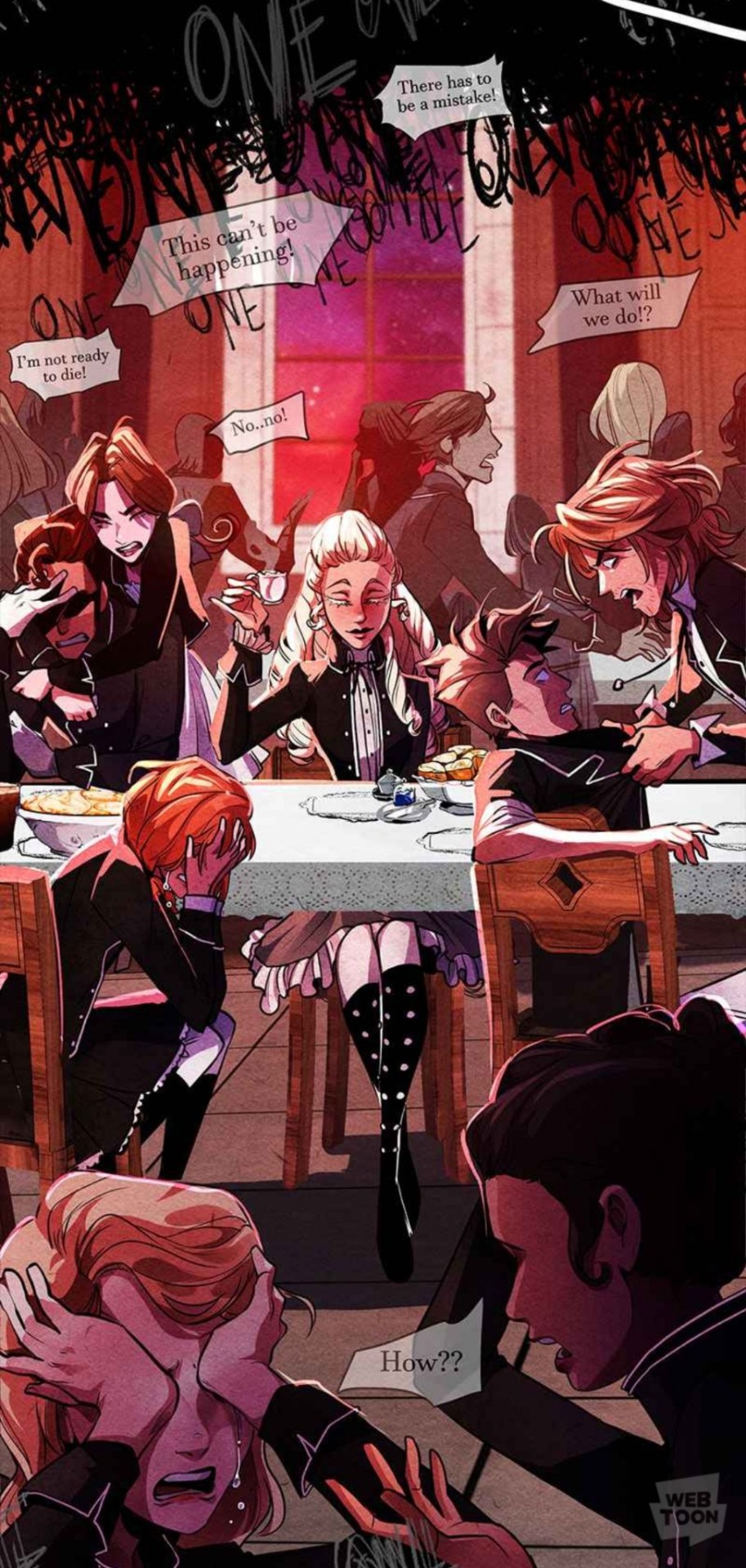

Now, I'm leaning a bit far out the window here, but take a good look at Prospero in the left picture above, he looks more frustrated than anything. His chances just got a lot worse, he needs to rethink his strategy and on top of all that Ada is invading his personal space again.
Moving forward to what I think makes their mutual betrayal inevitable, the episodes after the Mansion Arc (this is were it gets interesting):
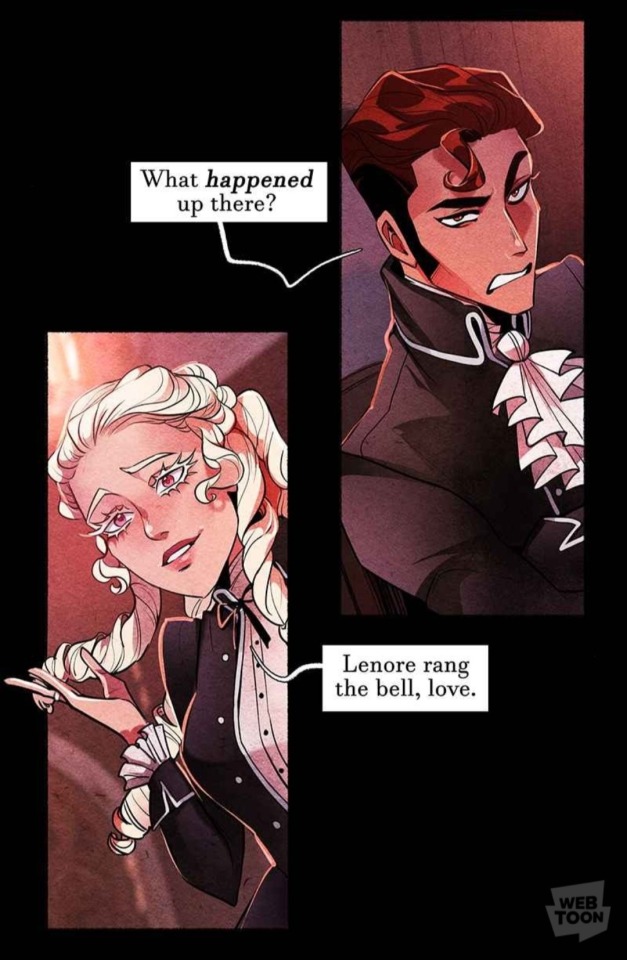
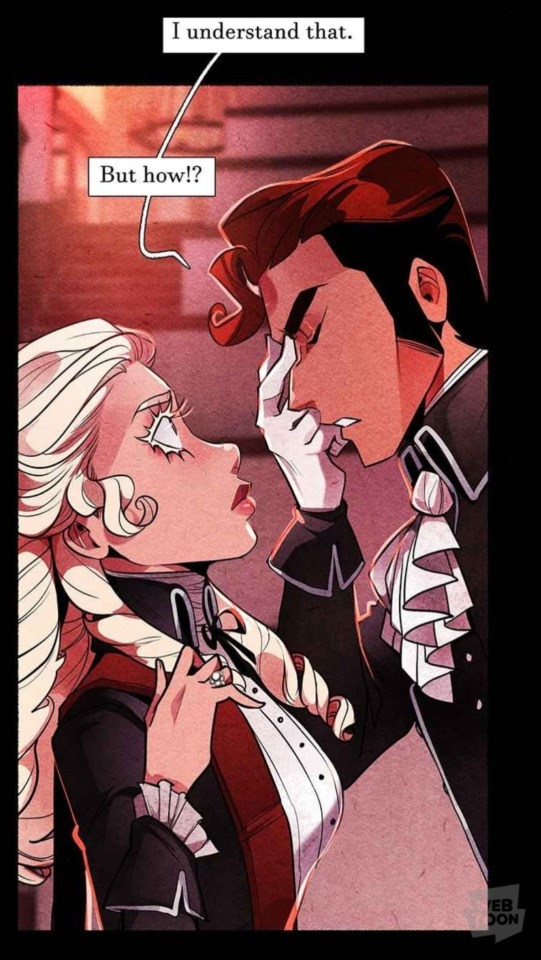
Until now we have seen Prospero mostly be mildly bothered by whatever is happening. When everything fell apart during the Lesson and everyone except for him apperently just did not do their job, he seemed like he was about to explode and seriously questioning his choice of team. Everyone else appeared to just want to go on with the day, Prospero however demanded answers, proving that he cares to win this entire game without getting side tracked.
Further his behaviour during the lesson shows that he actually doesn't get how anyone else would still be reluctant to kill their friends here. He was genuinely not expecting anyone to act out of empathy anymore.
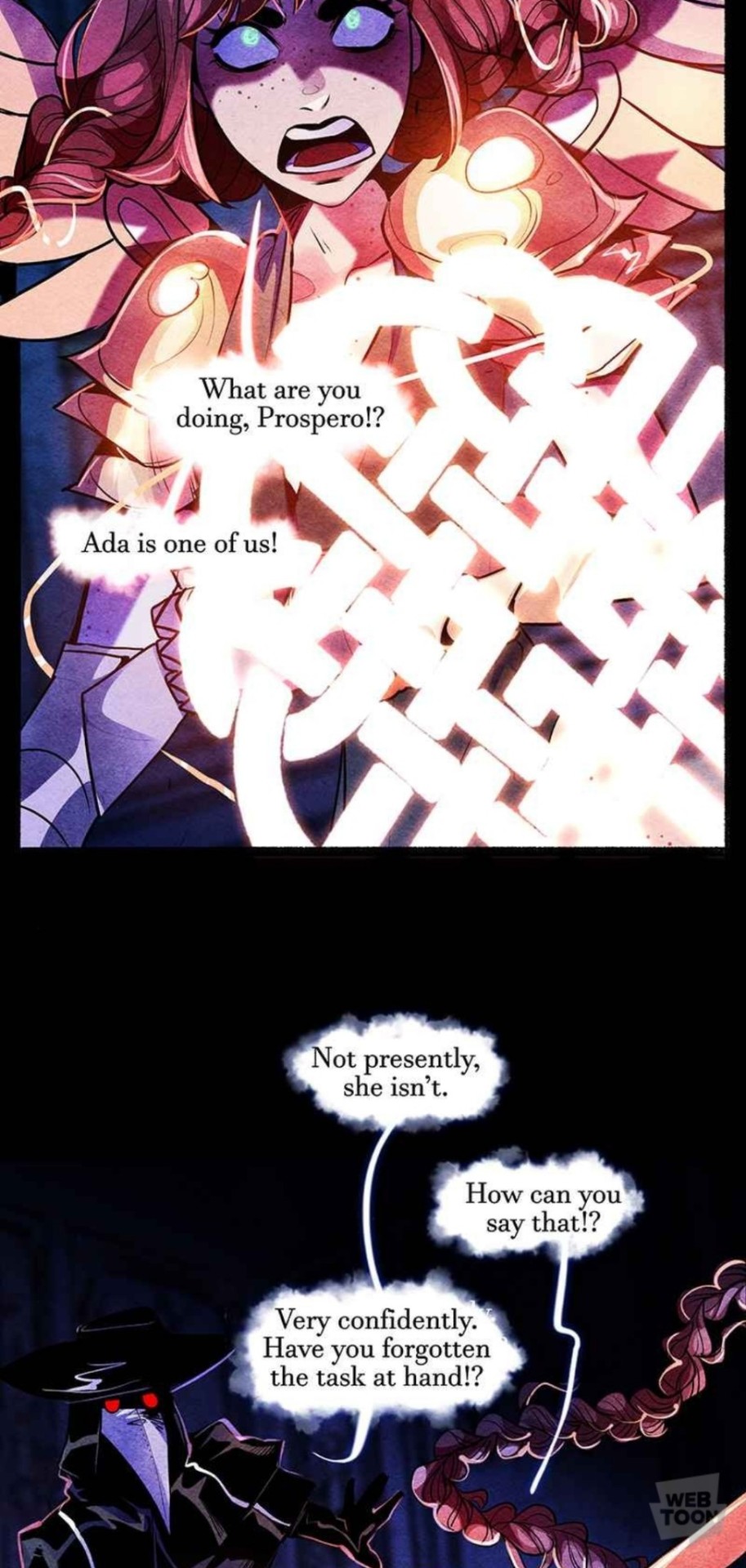
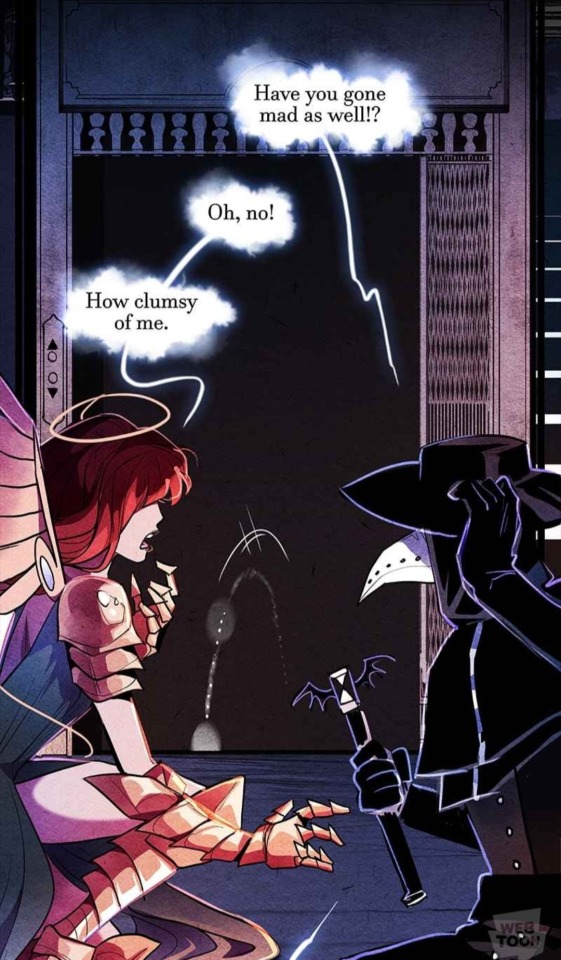
And after the widow's watch affair and him witnessing Annabel freaking out after the labyrinth and smoothly asking about Pluto instead of giving an explanation, he is surely just one big-ish failure or unwillingness to take action away from openly confronting Annabel how it can be that whenever she is alone with Lenore, things go south ways, how whenever people want to act against Lenore, she calls it a waste of time despite the growingly obvious threat that Lenore poses.
I think Annabel actually does matter to him, and I think he matters to Annabel as well, but both of them expect something really specific from one another and sympathy alone means little to them.
Now about Annabel saving Prospero.
I believe this says everything:
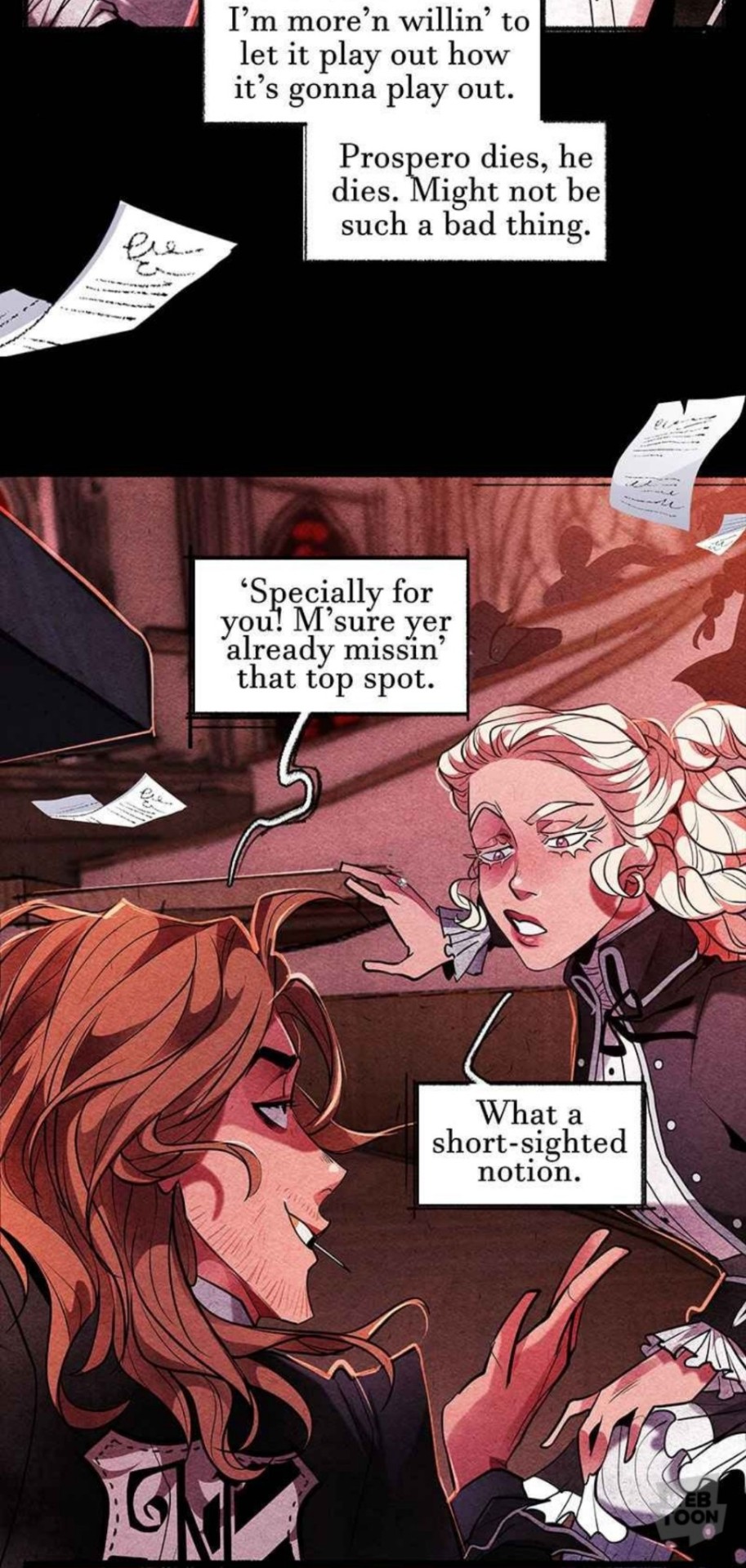
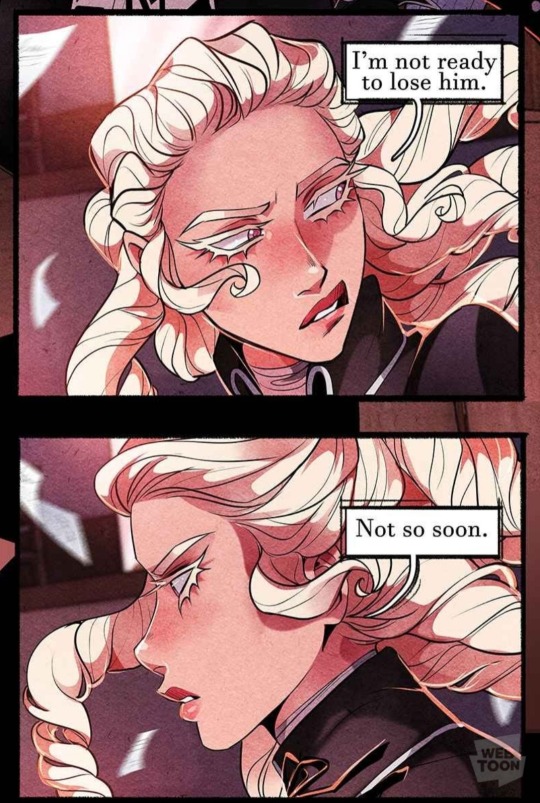
Since Annabel is a chess player, get ready for chess metaphors:
In chess, most gambits are about giving away a pawn. Why? Because a pawn has very little value on its own and sacrificing a pawn in order to get a slightly more profitable structure on the board can actually be worth it.
Sacrificing a queen? If you do something like that, you better be 100% sure you're seeing a forced checkmate.
Not only is Prospero's spector really powerful, Prospero is also the only thing keeping Annabel in control of her own team right now. Other than Prospero who's supporting her as long as she keeps bringing results, she is stuck with Ada who is a complete wild card and useless most of the time, Morella who is only half on her team, Will who is loyal mostly to Montresor and Montresor who constantly challenges her leadership.

The way things are standing right now, everything she has build would fall apart the very moment Prospero is gone.
Also, what if Annabel and Lenore have to stay long enough for their teams to start falling apart? Whom does Annabel want to face in a one on one? Someone like Montresor who's spector can very much use brute force against her or someone like Prospero who's spector is similarly unforceful as hers?
We even saw, that Annabel can just simply neutralise Prospero's rats with her fog, leaving him with no real attack on her. While he applies her with status conditions she can use her blossoms to attack him after she used her fog to make his rats disappear like she did on the widow's watch

Annabel did not safe him because she likes him, which she does. She saved him because he is a very important piece for her game and no real threat to her in the long run.
Prospero follows Annabel not because he likes her, which he does, but because she keeps bringing results. Or at least she did until rather recently.
#nevermore webtoon#annabel lee whitlock#prospero#annabel lee nevermore#prospero nevermore#annabel lee#annabel nevermore#annabel#nevermore
278 notes
·
View notes
Text
How to Stop Fascism
Five Lessons of the Nazi Takeover
Timothy Snyder
Jul 05, 2024
As the United States hovers at the edge of fascism, the history of Germany can help.
To be sure, Americans have other histories to ponder, including their own. Some American states, right now, are laboratories of authoritarian rule (and resistance). The American 1860s and American 1930s reveal tactics authoritarians use, as well as the weaknesses of the American system, such as slavery and its legacy. At those times, though, Americans were lucky in their leadership. Lincoln and Roosevelt were in office at the critical moments. And so we lack the experience of the collapse of the republic.
We can certainly learn from contemporary authoritarian success, as in Russia and in Hungary, which I have written about elsewhere. Yet the classic example of a major economic and cultural power collapsing into fascism remains Germany in 1933. The failure of the democratic experiment in Germany led to a world war as well as the Holocaust and other atrocities.
Yet today a taboo hovers around anything concerning Hitler. As soon as the collapse of the German republic in 1933 is evoked, American voices commence a fake lament — America is uniquely good so nothing about Nazis can ever apply, and/or Hitler was uniquely evil and so nothing concerning him is relevant.
To be sure, every person and every event is in some sense unique. But history is precisely the interaction of individuals and situations which, seen in isolation, will appear unique. The taboo on fascist history shoves people back to a turbulent present, leaving them feeling more helpless. It is an element of the fascist takeover.
The lessons from Germany that I present below are not at all new. We have been trained by digital media to believe that only what happens right now matters. But the people who intend to destroy the American constitutional republic have learned from the past. One of the basic elements of Project 2025, for example, is what the Nazis called Gleichschaltung: transforming the civil service into a fascist nest.
Those who wish to preserve the American constitutional republic should also recall the past. A good start would be just to recall the five basic political lessons of 1933.
1. Voting matters. Hitler came to power after an election which enabled his appointment as head of government. It is much easier for fascists to begin from within than to begin from without. Hitler’s earlier coup attempt failed. But once he had legitimate power, inside the system as chancellor (prime minister), he could manipulate it from within. In the American system, “voting” means not just going to the polls yourself, but making donations, phone-banking, and knocking on doors. We are still, happily, at the stage when unglamorous actions can make the difference.
2. Coalitions are necessary. In 1932, in the crucial German election, the far left and the center left were separated. The reasons for this were very specific: Stalin ordered the German communists to oppose the German social democrats, thereby helping Hitler to power. To be sure, the American political spectrum is very different, as are the times. Yet the general lesson does suggest itself: the left has to hold together with the the center-left, and their energies have to be directed at the goal rather than at each other.
3. Conservatives should be conservative. Which way the center-right turns can be decisive. In Germany in 1932, conservatives enabled the counter-revolution. They did not see Hitler and his Nazis as something different from themselves. They imagined, somehow, that Hitler would preserve the system rather revolutionize it. They were wrong, and some of them paid for the mistake with their lives. As in American today, the German “old right” was less numerous than the “new right,” the fascists. But how the traditionalist center-right acts can very well make the difference.
4. Big business should support democracy. In the Germany of the 1930s, business leaders were not necessarily enthusiastic about Hitler as a person. But they associated democracy with labor unions and wanted to break them. Seeing Hitler as an instrument of their own profit, business leaders enabled the Nazi regime. This was, in the end, very bad for business. Although the circumstances today are different, the general lesson is the same: whether they like it or not, business leaders bear responsibility for whether a republic endures or is destroyed.
5. Citizens should not obey in advance. Much of fascism is a bluff — look at our loyal cult, listen to our outrageous language, heed our threats of violence, we are inevitable! Hitler was good at that sort of propaganda. Yet to gain power he needed luck and the errors of others. American fascism, likewise, is far from inevitable. It too is largely bluff, most of it digital. The internet is much more fascist than real life, which is discouraging. But we vote in the real world. The crucial thing is the individual decision to act, along with others, for four months, a little something each day, regardless of the atmospherics and the polls and the media and the moods.
It’s simple: recalling history, we act in the present, for a future that can and will be much better.
72 notes
·
View notes
Text
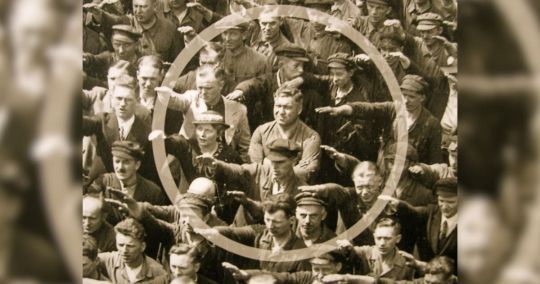
You may have seen this iconic photo before.
The photo took place in 1936 N*zi Germany in an event featuring Adolf Hitler. As you can see, there is a sea of people saluting "Der Führer".
During this tumultuous time, some courts required those in attendance to salute their leader.
But, in this sea of N*zi supporters, one man stands alone, defiant, arms crossed, refusing to salute the N*zi leader.
That courageous man was believed to be August Landmesser.
Landmesser had previously been a loyal N*zi follower.
First, some background. Hitler came to power after he was convicted and charged with treason after a failed coup in 1924 to overthrow the German government, according to The Smithsonian.
The failed coup, the Beer Hall Putsch, resulted in violence and deaths, but it gave Hitler a platform to espouse his beliefs on the failure of the current government, which were publicized in 1920 in a 25-point platform - “a haphazard mixture of antisemitism, nationalism and socialism, all tied to a furious rejection of the Treaty of Versailles,” according to the Auschwitz-Birkenau Memorial Museum.
Helped by the onset of the worldwide Great Depression in 1929, Hitler and the N*zis needed one or more groups to put the blame on and rally the citizens - that group back then was the Jews.
“Hitler offered the Germans a relatively coherent vision of national greatness, in which history and geopolitics destined Germany for the leading role in Europe,” according to the Auschwitz-Birkenau Memorial Museum. “This vision swept many off their feet.”
The Germans submitted “to the leadership of Adolf Hitler, who always knew best what needed to be done, and who was always right.”
“The popularity of the N*zis therefore stemmed from an accurate reading of the public mood; the adoption of a program that combined a rather dissonant assortment of nationalist, socialist, and anti-Semitic slogans; and the fact that, in Adolf Hitler, the party had a charismatic leader,”
according to the Auschwitz-Birkenau Memorial Museum.
Back to August Landmesser.
“Landmesser joined the N*zi Party in 1931 in hopes of gaining employment and was a member until 1935,” according to writer Andrew Kaczynski.
After joining the N*zi party, Landmesser would fall in love - with a Jewish woman named Irma Eckler. He would soon discover what the N*zi party was all about and he and his family would get caught up in its deadly race laws.
After the N*zi party found out Landmesser was engaged to a Jewish woman, he was expelled from the party. But, it didn't end there.
When Landmesser and Eckler tried to file a marriage application in Hamburg, the union was denied under the newly enacted Nuremberg Laws.
~~~
The Nuremberg Laws cast a “dark shadow [which] remains an enduring testament to humanity’s capacity for cruelty,” wrote Baruch Adler, Vice Chair of The International March of the Living.
“They institutionalized racial discrimination and persecution against Jews, serving as a chilling precursor to the horrors of the Holocaust. However, beyond their historical significance, they offer a stark lesson for our contemporary world in the ongoing battle against racism and prejudice.”
The International March of the Living continues, “The Nuremberg Laws, consisting of the Reich Citizenship Law and the Law for the Protection of German Blood and German Honor set out to strip Jews of their fundamental rights and dignity. These laws criminalized Jews’ participation in public life, engagement in German culture, and even their right to marry non-Jewish Germans. Essentially, the Nuremberg Laws relegated Jews to second-class citizenship and legitimized their persecution.
“The consequences of these laws were nothing short of catastrophic. Families were torn apart, livelihoods destroyed, and a pervasive fear enveloped the Jewish community in Germany. These laws laid the foundation upon which the N*zi regime built its monstrous campaign of extermination, the Holocaust. The systematic genocide of six million Jews can be traced back to the dehumanization and persecution initiated by the Nuremberg Laws.”
“Custom and law are closely linked systems that affect how people act toward each other,” according to the Houston Holocaust Museum. “In both the post-Civil War United States and in N*zi Germany, the freedoms and rights of some groups of people were limited. Each country developed a system of racially based laws influenced by past customs and beliefs. These systems would dramatically shape history.
“Under each system, groups were targeted. They lost important political, economic and social rights. African Americans were the primary target under the U.S. system of Jim Crow laws . . . In contrast, Jewish people were the primary target under the Nuremberg Laws of N*zi Germany.”
Even today, many countries target similar groups.
~~~
According to the United States Holocaust Memorial Museum:
“Hitler was obsessed with race long before becoming Chancellor of Germany. His speeches and writings spread his belief that the world was engaged in an endless racial struggle. White Nordic people topped the racial hierarchy; Slavs, Blacks, and Arabs were lower, and Jews, who were believed to be an existential threat to the “Aryan Master race,” were at the very bottom. When the N*zis came to power, these beliefs became government ideology and were spread publicly in posters, radio, movies, classrooms and newspapers. They also served as a basis for a campaign to reorder German society, first through the exclusion of Jews from public life, then the murder of disabled Germans as well as Slavs and, ultimately, the effort to exterminate European Jewry.
“In order to make Jewish persecution publicly palatable, N*zi propagandists branded Jews as a biological threat to Germany. Government-sponsored racist propaganda was widely distributed denouncing Jews as “alien,” and “parasitic,” and responsible for Germany’s cultural, political, and economic “degeneration.” These words had an enormous effect, creating an environment in which persecution and violence were acceptable.”
“Prior to the war, the N*zis had focused on encouraging Jews to emigrate from the Greater German Reich through their antisemitic policies and actions,” according to The Weiner Holocaust Library. “By 1939 in Poland, the N*zis escalated their actions, and segregated and imprisoned Jews for future deportation. At this stage, the N*zis planned to deport Jews to Madagascar or lands further east. Later, in 1941, as both of these options were realised to be infeasible, the N*zis created extermination camps to liquidate the populations of the ghettos instead.”
~~~
In 1935, Landmesser and Eckler, amidst all the turmoil, would welcome their first daughter, Ingrid.
By this time, Landmesser was well informed about the N*zi party, and, so supposedly, on June 13, 1936, when given an opportunity to express his thoughts about Hitler and the N*zi party and what it was doing to his homeland, he decided to give his crossed-arm stance during Hitler's speech at the shipyard, to be captured forever in the iconic photograph, according to his daughter.
[The N*zi or Hitler salute debuted . . . as a way to pay homage to Adolf Hitler,” according to the Anti-Defamation League. “It consists of raising an outstretched right arm with the palm down . . . Since World War II, neo-N*zis and other white supremacists have continued to use the salute, making it the most common white supremacist hand sign in the world.”
“By 1934, it became mandatory, and special courts were established to punish those who refused, with penalties ranging from fines and intimidation to imprisonment in concentration camps,” according to the Weiner Holocaust Library.]
Landmesser became famous for the photograph showing him refusing to give the N*zi salute while surrounded by others who complied.
When the photo reemerged online as a meme, it was titled, “Be this Guy.”
~~~
In 1937, Landmesser decided N*zi Germany was no place to raise his family, he felt unsafe, and all the stories of violence against anyone who disagreed with "Der Führer" frightened him. He decided to flee to Denmark with his family, but he was detained at the border. He was accused of "dishonoring the race," or "racial infamy," under the Nuremberg Laws.
But, he refused to abandon his wife and child, ignoring N*zi wishes to end their relationship. He was arrested, sent to a N*zi concentration camp to serve three years.
He would never again see the woman he loved nor see his daughter(s) (his wife at the time was pregnant with a second child) grow up.
His wife was arrested by the Gestapo, giving birth to the couple's second child, Irene, in prison. Afterwards, she was sent to an all-women's concentration camp, then supposedly transferred in 1942 to what the N*zi's called a "euthanasia center" where she was murdered with 14,000 others.
Landmesser, lost without his wife and children, was released only to be drafted into war in 1944, where he was declared missing in action in Croatia and presumed dead.
The children of the couple would survive.
The photo of that moment in 1936 would lay unnoticed for nearly 55 years, until 1991, when a German newspaper republished the photograph, asking its readers whether anyone could identify the lone man in the picture.
During that time, one of the couple's daughters, Irene Eckler, had been researching her family, trying to gain an understanding of what happened to them. She and her sister had been separated, but had survived the war without their parents. She had found some information at Fasena, an educational site on the N*zi death camp at Auschwitz. She then saw the newspaper article and identified the photograph.
She would then publish her findings in a book titled, "Irene Eckler: A Family Torn Apart by Rassenschande (race disgrace)".
The picture would re-surface again after it was published by the Washington Post and then go viral online.
Writer Zoheb Alem in 2024 wrote:
“American poet E.E. Cummings once said, ‘To be nobody but yourself in a world which is doing its best to make you everybody else – means to fight the hardest battle which any human being can fight.’
“These words perfectly capture the story of August Landmesser, a courageous man who defied N*zi ideology for the love of his life.”.
~ jsr
The Jon S. Randal Peace Page
23 notes
·
View notes
Text
by Daniel Greenfield
Some were shocked to learn that Israel’s successful ‘Pagergeddon’ operation had been the work of a female intelligence operative under thirty. But they shouldn’t have been.
Israel’s digital intelligence capabilities rely on the work of young women operating in arenas like Unit 8200 which monitors enemy communications, plants surveillance devices and puts together intel data to form a bigger picture, and Unit 414, the unarmed observers on the front line, many of whose members were killed and a number captured during the Hamas invasion on Oct 7.
Women from 8200 and 414 had sounded early warning alerts about Hamas training drills and movements that went unheard before Oct 7. And Unit 414 had lost 27 of its own on Oct 7.
Unit 8200, which is 55% female, had taken some of the blame for the failures on Oct 7. The assault on Hezbollah provided a unique opportunity for Israel’s women to strike back.
‘Pagergeddon’ went viral on social media but it was only a piece of a bigger puzzle. The Israelis had deconstructed the lessons of Oct 7 and turned them against the Islamic terrorists. Hamas and its Iranian masterminds had wrecked Israeli battlefield communications in the initial attack. Israeli military units were slow to respond, aerial units were unable to strike and hours passed before the military leadership understood the scope of the terrorist assault on the homeland.
The first thing Israel came after were Hezbollah’s communications. ‘Pagergeddon’ was a crucial last step that began with Israel infiltrating Hezbollah’s landlines and then its other communications. When Hezbollah leaders fell back on the pagers and handheld radios, also favored by Hamas, that had been rigged to explode, communications were fatally scrambled.
Hezbollah leaders were forced to begin meeting in person and retreating to bunkers which made it all too easy to take them out. With a broken leadership and communications structure, Hezbollah lacked the ability to decisively move its forces and quickly respond. Within a week, its protectors at the UN and the White House were frantically urging a ‘ceasefire’.
Destroying communications and the chain of command is standard military doctrine, and Israel’s successful implementation of it within such a short time and against one of the world’s largest Islamic terrorist groups will be studied in military academies for generations, but there was also something feminine about breaking apart Hezbollah’s social bonds before a bombing campaign.
While misleading photos and videos of female IDF soldiers carrying rifles circulate on social media, the burden of front line combat is largely handled by men. The killing and capture of unarmed Israeli female observers from Unit 414 remains a deep moral failure. The true role of Israeli women is to act as the invisible heart and soul of the country’s national defense.
When Iron Dome and other interceptor systems take down incoming attacks, the odds are very good that the country’s female air defense controllers are alert and responding. And the extent to which Hezbollah’s communications were penetrated and turned against the terror group owes much to nameless female ‘keyboard warriors’ who exposed the enemy’s weaknesses.
Hezbollah was uniquely vulnerable to these tactics because it was in the awkward stage between terror group and terror state, too big to hide in tunnels, too small to have an effective air defense system, and too dumb to realize that tens of thousands of rockets were still no match for what a first rate air force could do to all its infrastructure and weaponry.
45 notes
·
View notes